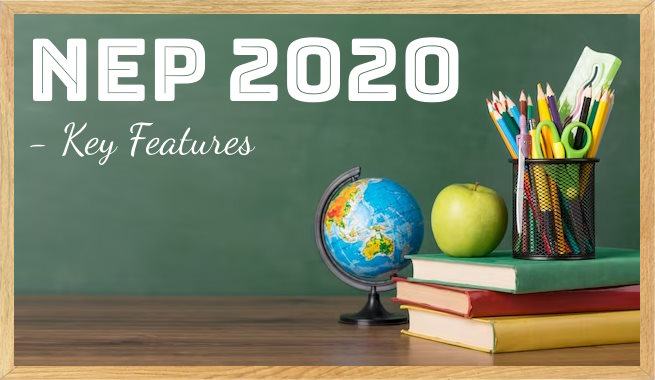Key features of National Education Policy 2020
The National Education Policy 2020 (NEP 2020) is a comprehensive framework for the development of education in India.

Table of Contents
- 1 Key Features of National Education Policy 2020
- 1.1 1. Holistic and Multidisciplinary Education
- 1.2 2. Early Childhood Care and Education
- 1.3 3. 5+3+3+4 Structure
- 1.4 4. Multilingualism
- 1.5 5. Technology in Education
- 1.6 6. Teacher Education and Training
- 1.7 7. Vocational Education
- 1.8 8. Gender and Inclusion
- 1.9 9. Governance and Funding
- 1.10 10. NEP 2020 focuses on Learning Outcomes
- 1.11 11. Flexibility and Choice
- 1.12 12. Use of Local Resources
- 1.13 13. NEP 2020 Promotes Arts, Culture, and Sports
- 1.14 14. Teacher Recruitment and Retention
- 1.15 15. Internationalization of Education
- 1.16 16. Education for Sustainable Development
- 1.17 17. NEP 2020 Promotes Research and Innovation
- 1.18 18. NEP 2020 incorporates Technology in Teacher Education
- 1.19 19. NEP 2020 Focus on Higher Education Institutions
- 1.20 20. NEP 2020 Recognizes Open and Distance Learning
Key Features of National Education Policy 2020
The key features of NEP 2020 are:
1. Holistic and Multidisciplinary Education
The NEP 2020 emphasizes the need for a holistic and multidisciplinary approach to education, which integrates various fields of knowledge and emphasizes critical thinking and problem-solving.
2. Early Childhood Care and Education
The policy recognizes the importance of early childhood care and education (ECCE) and seeks to provide universal access to quality ECCE for all children up to the age of 6.
3. 5+3+3+4 Structure
The NEP 2020 proposes a new structure for school education, comprising 5 years of foundational stage (3 years of preschool and Grades 1-2), 3 years of preparatory stage (Grades 3-5), 3 years of middle stage (Grades 6-8), and 4 years of secondary stage (Grades 9-12).
4. Multilingualism
The policy emphasizes the importance of multilingualism and proposes the teaching of at least two languages, including the mother tongue or local language, in schools.
5. Technology in Education
The NEP 2020 recognizes the potential of technology in education and seeks to promote the use of digital technology and online learning platforms.
6. Teacher Education and Training
The policy emphasizes the need for continuous professional development of teachers and proposes the establishment of a National Curriculum and Pedagogical Framework for Teacher Education.
7. Vocational Education
The NEP 2020 recognizes the importance of vocational education and proposes the integration of vocational education into mainstream education.
8. Gender and Inclusion
The NEP 2020 emphasizes the need to promote gender and social inclusion in education and proposes several measures to ensure equitable access to education for all.
9. Governance and Funding
The policy proposes several measures to improve governance and funding in education, including the establishment of a National Education Commission and the allocation of at least 6% of GDP to education.
10. NEP 2020 focuses on Learning Outcomes
The NEP 2020 emphasizes the need to shift from a system that focuses on inputs to one that focuses on learning outcomes, and proposes the establishment of a National Assessment Centre to measure learning outcomes.
11. Flexibility and Choice
The policy seeks to promote flexibility and choice in education, and proposes the introduction of multiple entry and exit points, credit-based programs, and the integration of vocational education into mainstream education.
12. Use of Local Resources
The NEP 2020 emphasizes the use of local resources and knowledge in education, and proposes the development of local curricula and the inclusion of local arts, crafts, and knowledge systems.
13. NEP 2020 Promotes Arts, Culture, and Sports
The policy recognizes the importance of arts, culture, and sports in education and seeks to promote their integration into the curriculum.
14. Teacher Recruitment and Retention
The NEP 2020 proposes several measures to improve teacher recruitment and retention, including the establishment of a National Recruitment Agency for recruitment to non-technical posts in government schools and the introduction of tenure track systems in universities.
15. Internationalization of Education
The policy seeks to promote the internationalization of education and proposes several measures to facilitate the entry and exit of students and faculty from foreign countries.
16. Education for Sustainable Development
The NEP 2020 recognizes the need to integrate education for sustainable development into the curriculum and proposes the establishment of a National Centre for Curriculum and Pedagogy for Education for Sustainable Development.
17. NEP 2020 Promotes Research and Innovation
The policy seeks to promote research and innovation in education and proposes several measures to encourage research and innovation in universities and colleges.
18. NEP 2020 incorporates Technology in Teacher Education
The NEP 2020 emphasizes the need to integrate technology into teacher education and proposes the establishment of a National EdTech Forum to facilitate the adoption of technology in education.
19. NEP 2020 Focus on Higher Education Institutions
The policy proposes several measures to improve the quality of higher education institutions, including the introduction of a graded accreditation system, the establishment of a National Research Foundation, promotion of research and innovation, promotion of autonomy and accountability in universities and colleges, establishment of multidisciplinary institutions, and the introduction of flexible and multidisciplinary undergraduate programs.
20. NEP 2020 Recognizes Open and Distance Learning
The NEP 2020 recognizes the importance of open and distance learning (ODL) and proposes the development of a comprehensive ODL framework for education, including the creation of a dedicated division for ODL within the Ministry of Education.


